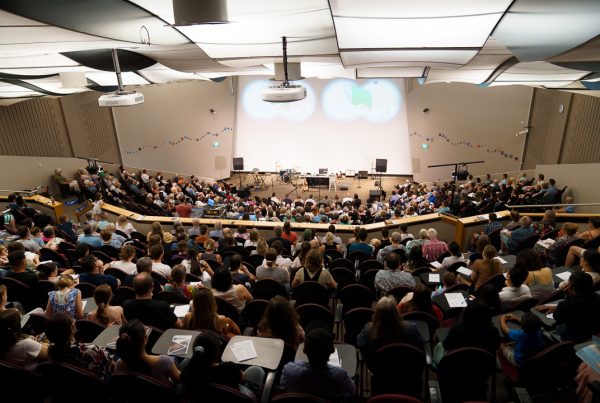31 August 2017
Something I’ve noticed when I’ve visited other churches on my holidays is how little I open my mouth. Some of you might think that’s a good thing! But let me explain.
Some of you might think that’s a good thing! But let me explain.
Generally we try to visit a Bible-based, gospel-centred church when we are away. In some other places, that means visiting other denominations, and I am glad to do so.
I wrote earlier in the year that one thing that is often missing is the reading of Scripture, other than the sermon passage (see 1 Timothy 4:13).
But another thing I’ve noticed is that just about the only time I am invited to open my mouth is for the songs. The rest of the time no one says anything, except for the person up the front. Everything else, apart from the singing, is done for you.
To me, it sometimes feels quite passive. One time in a small rural church, I was even mildly embarrassed to be the only person who said ‘Amen’, when the pastor reached the end of leading the prayers for the day. Apparently, it wasn’t even done to affirm his requests!
In my Minister’s Letters through 2017, I’m spending some time unpacking the “Values” in St Michael’s “Vision 2020” statement. Here’s the sixth on the list of things we value:
Gatherings of breadth and depth in confession, creed, song, and prayer
I realise we are all partly a product of our past experiences, but it has reinforced for me the value of corporate confession, creed and prayer alongside song; that is declaring our faith in unison, and articulating our praise and common requests together in prayer. They remind us that we are gospel people, sinners saved by God’s grace in Jesus.
Sometimes, the Psalms contain first person singular expressions of prayer or faith. It’s important to pray personally and privately. But often the prayers and songs in the Bible are plural. As in Colossians 3:16…
“Let the word of Christ dwell in you (plural!) richly as you (plural!) teach and admonish one another with all wisdom, singing psalms, hymns and spiritual songs with gratitude in your ((plural!) hearts to God.”
It’s very active learning and participation, and a mutual expression of relationships of love, with God and each other.
The value statement also looks for depth. One danger with shared statements of faith – like the Apostles Creed – or prayer – like the Lord’s Prayer or one confessing our sins, is that we can ‘rattle them off’ without thinking much. That’s to be avoided as much as passivity. Slow down. Think about those words. And thank God for some variety too.
Actually one of the things I appreciate almost more than anything else about our gatherings is the way those who volunteer to lead public prayers do so with such breadth. They cover the key things: praying for world, community, leaders, church, gospel outreach and matters of care and concern to our members. But they do it with an individual touch and interest, and yet with a biblical consistency to which I always find myself saying ‘Amen’!
Breadth and depth of song is also important. I don’t mind receiving suggestions of new songs for church, but we especially love ones, which are not just shallow or formulaic. And it’s also why it’s great to appreciate the depths of older hymns, which seemed to cover more topics and moods.
Actually, that reminds me: I encourage you to try another congregation of St Michael’s at least twice a year, to remind yourself the ways of doing things you find most comfortable at church are not the only way things can be done.
Warmly in Christ,
Sandy Grant
Senior Minister





